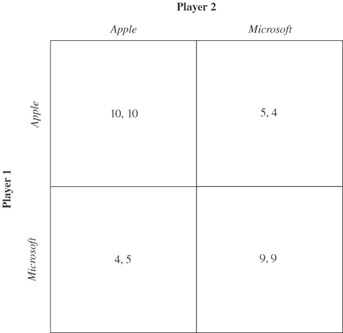Success, Failure, and Network Externalities
Many people considered and still do consider Apple computer’s operating system superior to Microsoft’s. Alas, Microsoft’s operating system dominates the market while Apple is a smaller (sometimes it seems dying) niche player. Network externalities caused by compatibility problems are the reason that most everyone buys Microsoft operating systems. Operating systems exhibit network externalities because software written for a computer with one type of operating system will not easily run on a computer with a different system. Thus, software written for Microsoft’s operating system will not work on an Apple computer or an IBM-compatible computer that has a non-Microsoft operating system.
Software makers want to sell as many copies of their product as possible. Therefore, most software makers devote the majority of their resources to writing software for the type of computer that most people have. A consumer, therefore, benefits from having the same operating system as most everyone else. As a result, the more people who use the same type of operating system as you do, the more software there will be for you to use.
Microsoft’s continuing popularity arises from a virtuous, network externality–driven cycle; since most everyone uses Microsoft’s operating system, most everyone else wants to use Microsoft’s operating system. Consumers play a coordination game with each other where most people want to use the same kind of computer as everyone else does. For whatever reason, consumers have chosen to coordinate on Microsoft-based personal computers. As the game in Figure 28 shows, even if people prefer Apples, they might end up buying Microsoft-based computers. In this game if each person expects the other to buy a Microsoft-based computer, then they are better off getting one and receiving a payoff of 9, rather than getting an Apple computer and possibly receiving a payoff of only 5. What a great situation for Microsoft: Its product stays popular because it is popular.

Figure 28
Apple lost a chance to take advantage of network externalities. Bill Gates, in 1985, wanted to modify Macintosh’s operating system (which required Motorola processors) so it could be run on Intel processors. Apple refused to give him the necessary legal permission.[2] Had Apple’s operating system been made compatible with Intel chips, then Apple would have benefited from the network externalities that made Gates so rich.[3] Microsoft understood what Apple didn’t: Where network externalities are concerned, size doesn’t just matter, it’s the dominating consideration.
Like Microsoft, Intel also benefits from network externalities. Since most computers run on Intel microprocessors, software developers make most of their products compatible with Intel microprocessors, which, of course, causes most consumers to want to buy Intel-based computers. As with Microsoft’s operating system, Intel microprocessors are popular because a lot of people buy them.
[2]Lessig, 63.
[3]Ibid.
EAN: N/A
Pages: 260